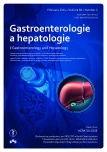-
Medical journals
- Career
Hereditary angioedema as a cause of abdominal pain
Authors: K. Hrubišková; P. Jackuliak; J. Payer
Authors‘ workplace: V. interná klinika LF UK a UN Bratislava, SR
Published in: Gastroent Hepatol 2014; 68(2): 149-153
Category: Clinical and Experimental Gastroenterology: Review Article
Overview
Hereditary angioedema is a rare disease that may have potentially fatal consequences. Despite the fact that recently there is a deeper understanding of the pathophysiology of the disease, it is still a diagnostic challenge. The average time from the start of symptoms to the diagnosis is in avarage 10 to 25 years. The problem is the wide variety of clinical symptoms affecting various organ systems, the progress of the disease in attacks, and also a lack of awaraness of this disease in medical professionals. The aim of this article is to review the pathofysiology, the clinical picture and briefly the current treatment options. The authors also present a case report of a young female patient with a typical clinical picture of hereditary angioedema.
Key words:
hereditary angioedema – C1 inhibitor – edema
The authors declare they have no potential conflicts of interest concerning drugs, products, or services used in the study.
The Editorial Board declares that the manuscript met the ICMJE „uniform requirements“ for biomedical papers.Submitted:
20. 1. 2014Accepted:
8. 3. 2014
Sources
1. Cugno M, Zanichelli A, Foieni F et al. C1-inhibitor deficiency and angioedema: molecular mechanisms and clinical progress. Trends Mol Med 2009; 15(2): 69–78. doi: 10.1016/j.molmed.2008.12.001.
2. Hanzlíková J. Hereditární angioedém. [online]. Dostupné z: www.euni.cz.
3. Buc M. Komplementárny systém. In: Buc M. Základná a klinická imunológia. Bratislava: Univerzita Komenského v Bratislave 2009.
4. Bork K, Wulff K, Hardt J et al. Hereditary angioedema caused by missense mutations in the factor XII gene: clinical features, trigger factors, and therapy. J Allergy Clin Immunol 2009; 124(1): 129–134. doi: 10.1016/j.jaci.2009.03.038.
5. Bowen T, Cicardi M, Farkas H et al. 2010 International consensus algorithm for the diagnosis, therapy and management of hereditary angioedema. Allergy, Asthma Clin Immunolog 2010; 6(1): 24. doi: 10.1186/1710-1492-6-24.
6. Zuraw BL. Clinical practice. Hereditary angioedema. N Engl J Med 2008; 359(10): 1027–1036. doi: 10.1056/NEJMcp0803977.
7. Dagen C, Craig TJ. Treatment of Hereditary Angioedema: items that need to be addressed in practice parameter. Allergy Asthma Clin Immunol 2010; 6(1): 11. doi: 10.1186/1710-1492-6-11.
8. Craig T, Riedl M, Dykewicz MS et al. When is prophylaxis for hereditary angioedema necessary? Ann Allergy Asthma Immunol 2009; 102(5): 366–372. doi: 10.1016/S1081-1206(10)60506-6.
9. Cicardi M, Bork K, Caballero T et al. Evidence-based recommendations for the therapeutic management of angioedema owing to hereditary C1 inhibitor deficiency: consensus report of an International Working Group. Allergy 2012; 67(2): 147–157. doi: 10.1111/j.1398-9995.2011.02751.x.
10. Zuraw BL. HAE therapies: past present and future. Allergy Asthma Clin Immunol 2010; 6(1): 23. doi: 10.1186/1710-1492-6-23.
11. Cook HT, Botto M. Mechanisms of Disease: the complement system and the pathogenesis of systemic lupus erythematosus. Nat Clin Pract Rheumatol 2006; 2(6): 330–337.
12. Weiler CR, van Dellen RG. Genetic test indications and interpretations in patients with hereditary angioedema. Mayo Clinic Proc 2006; 81(7): 958–972.
Labels
Paediatric gastroenterology Gastroenterology and hepatology Surgery
Article was published inGastroenterology and Hepatology

2014 Issue 2-
All articles in this issue
- 1,000 TIPS in UH Hradec Kralove: indications and surviving
- Budd-Chiari syndrome and TIPS – 21 years’ experience
- Transjugular intrahepatic portosystemic shunt in the therapy of refractory ascites: single center point of view
- Dispensarisation of patients after introduction of transjugular intrahepatic portosystemic shunt – diagnostics of shunt dysfunction and the possibilities of intervention
- Liver transplantation for hepatocellular carcinoma, long-term outcomes and risk factors of tumour recurrence (single-centre experience)
- EUS-guided choledochoduodenostomy use in the treatment of biliary obstruction
- Hereditary angioedema as a cause of abdominal pain
- Modern diagnostics of Lynch syndrome
- EUS workshop in Jablonec nad Nisou
- 13th Czech-Slovak IBD symposium
- 9th Congress of ECCO, Copenhagen, Denmark
- Announcement
- Justification
- Remsima™ – the first biosimilar infliximab
- Hepatology not only from Hradec Kralove
- Therapy of portal hypertension using transjugular intrahepatic portosystemic shunt – first 1,000 procedures in UH Hradec Kralove
- Malignant rectal melanoma – a rare case study and literature review
- Gastroenterology and Hepatology
- Journal archive
- Current issue
- Online only
- About the journal
Most read in this issue- Budd-Chiari syndrome and TIPS – 21 years’ experience
- Hereditary angioedema as a cause of abdominal pain
- Therapy of portal hypertension using transjugular intrahepatic portosystemic shunt – first 1,000 procedures in UH Hradec Kralove
- Modern diagnostics of Lynch syndrome
Login#ADS_BOTTOM_SCRIPTS#Forgotten passwordEnter the email address that you registered with. We will send you instructions on how to set a new password.
- Career

